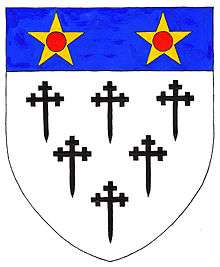Theophilus Clinton, 4th Earl of Lincoln
Theophilus Clinton, 4th Earl of Lincoln (c. 1600 - 21 May 1667) was an opponent of Charles I during and preceding the English Civil Wars.
| Theophilus Clinton | |
|---|---|
| Born | c. 1600 |
| Died | May 21, 1667 |
| Title | 4th Earl of Lincoln |
| Tenure | 1619 -1667 |
| Known for | Puritan opponent of Charles I |
| Nationality | English |
Family

Theophilus Clinton was the son of Thomas Clinton, 3rd Earl of Lincoln and Elizabeth Knyvett. He studied at Emmanuel College, Cambridge. He married firstly Bridget Fiennes, and secondly Elizabeth Gorges (died 1675). He inherited the title, Earl of Lincoln on the death of his father in 1619. His children were:
- Edward Clinton, Baron Clinton (1624 - 1657), married by 1652 Lady Anne Holles (died London, October 1707)
- Lady Katherine Clinton (died 1643), married 30 November 1639 George Booth, later Baron Delamer (18 December 1622 - Dunham Massey, 8 August 1684)
- Lady Arabella Clinton, married Robert Rolle (died 1663)
- Lady Margaret Clinton, married Hugh Boscawen
On his death in 1667, the title was inherited by his grandson.
Opposition to Charles I
Clinton was a puritan and has been described as a powerful friend of the puritans of Lincolnshire.[1] He was the son in law of William Fiennes, 1st Viscount Saye and Sele and shared his father in law's opposition to the King. He was an opponent of Charles I's forced loan and circulated a pamphlet which accused the King of attempting to overthrow parliament.[2] He was imprisoned in the Tower of London for his opposition while others within the household escaped to Massachusetts and other colonies.[3]
He refused to take the covenant and was excluded from the House of Lords.
Colonisation of North America
Clinton also shared his father in law's enthusiasm for colonisation of North America. He employed Thomas Dudley who went on to become the second governor of Massachusetts as steward at the family estate in Sempringham, Lincolnshire. Clinton's house at Sempringham was the location of a meeting in 1629 at which John Winthrop and others discussed the organisation of a proposed Massachusetts Bay Colony.[4] His brother Charles Fiennes, and his sister, Arbella Johnston, wife of Isaac Johnson (colonist) sailed to North America in the Winthrop Fleet.
Notes
- ↑ Hill, Sir Francis (2009). Tudor and Stuart Lincoln (reprint ed.). Cambridge University Press. p. 115.
- ↑ Herman, Peter C (2011). A Short History of Early Modern England. Wiley-Blackwell. p. 189.
- ↑ Schama, Simon (2001). A History of Britain, Volume Two: The British Wars 1603-1776. BBC Books. p. 57.
- ↑ Webster, Tom (2003). Godly Clergy in Early Stuart England. Cambridge University Press. p. 152.
| Peerage of England | ||
|---|---|---|
| Preceded by Thomas Clinton |
Earl of Lincoln 1619–1667 |
Succeeded by Edward Clinton, 5th Earl of Lincoln |